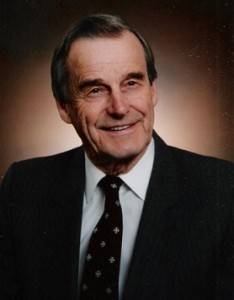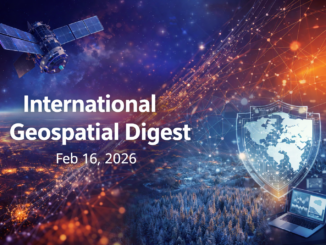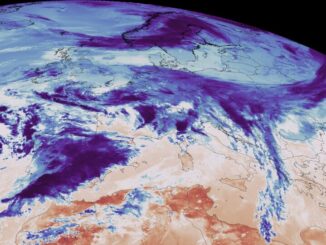Very Sad News for the Remote Sensing Community. / Triste nouvelle pour la communauté de télédétection. [CRSS-SCT]
Canadian Remote Sensing Society / Société canadienne de télédétection
Le français suit
It is with the heaviest of hearts that I convey to the remote sensing community the most sad news that our leader, mentor, and dear friend Lawrence W. “Larry” Morley has passed away.
Larry led a vigourous and active life, right up to the day of his passing, on the afternoon of Monday April 22 2013 at the young age of 93 years. He departed this world happy, and in peace, with his beloved wife Beverly and members of his family at home, by his side.
In the early 1970s, Dr. Morley was the founder and first President of the Canadian Remote Sensing Society (CRSS) and the first Director General of the Canada Centre for Remote Sensing (CCRS). His contributions to remote sensing in Canada and internationally are immense. He leaves for us all a legacy of integrity, passion, and dedication to the peaceful and productive use of remote sensing for the public good.
His professional achievements and awards are far too numerous to list here. I had the pleasure and honour of getting to know Larry quite well over the past four years. With all his accolades, he placed family first – the lead sentence of a biography he provided me for the Lethbridge conference in 2009 lists his year of birth (1920) and his wife, Beverly. When not with family, Larry made important and lasting contributions in several fields, most notably of course remote sensing, but also geology. He was the first geophysicist at the Geological Survey of Canada (GSC) from 1952, and he played a lead role in developing the Morley-Vine-Matthews hypothesis of magnetic imprinting of ocean basins that led to experimental proof and laid the foundation for the Theory of Plate Tectonics. He later led the development of remote sensing techniques that were instrumental in the production of thousands of maps of the natural resources of Canada and elsewhere.
He was a pioneer both scientifically and through numerous new initiatives in remote sensing, for which he was recognized as the first recipient of the CRSS Gold Medal in 1986. He was awarded the Gold Medal from the Royal Canadian Geographical Society in 1995, and in 1999 was appointed Officer of the Order of Canada (OC). A veteran of World War II, he served as a radar officer for the Royal Canadian Navy during the Battle of the Atlantic and other missions.
He was active in CRSS and remote sensing in general, and was eagerly looking forward to attending the 34th Canadian Symposium on Remote Sensing in Victoria this August, with particular interest in new initiatives in Arctic Surveillance. We are left with fond memories of having honoured Larry at our 33rd Canadian Symposium in Ottawa June 2012, a special time together that we will forever cherish.
Funeral arrangements are entrusted with Brian E. Wood Funeral Home in Owen Sound Ontario.
Messages of condolence can be posted and sent to Larry’s family via the online Guest Book at:
http://www.woodfuneralhome.ca/obituary/1178
On behalf of CRSS President Monique Bernier, our Executive, and all of us with the Canadian Remote Sensing Society, I express my personal gratitude to all that Larry has contributed to remote sensing, and for his strength, deep pride and unyielding support of CRSS from its earliest days to the recent years and now. We all send our love and wishes to Larry’s family both now, and as we go forth building on the legacy Larry has given us.
He will be dearly missed.
Derek R. Peddle, CRSS-SCT
Past-President and member, 2013 CRSS Executive
[email protected]
Société canadienne de télédétection / Canadian Remote Sensing Society
C’est avec grande émotion que je transmets à la communauté de télédétection la triste nouvelle du décès de notre chef, mentor, et ami cher, Lawrence W. ‘Larry’ Morley.
Larry a mené une vie rigoureuse et active jusqu’au jour de son décès, en après-midi du 22 avril 2013, à l’âge de 93 ans. Il a quitté ce monde heureux et dans la paix avec à ses côtés, son épouse chérie, Beverly, et les membres de sa famille.
Au début des années 1970, Dr Morley a fondé et présider la Société canadienne de télédétection (SCT) et fut le premier directeur général du Centre canadien de télédétection (CCT). Ses contributions à la télédétection au canada et sur la scène internationale sont immenses. Ils laissent à la communauté tout un legs d’intégrité, de passion et de dévouement dans l’utilisation pacifique et productive de la télédétection pour le bien public.
Ses réalisations professionnelles et les prix qu’il a reçus sont trop nombreux pour les énumérer ici. J’ai eu le plaisir et l’honneur d’être un proche ami de Larry au cours des quatre dernières années. Avec toutes ses accolades, Larry plaçait la famille d’abord – la première phrase d’une biographie qu’il m’a fournie en 2009 énumère son année de naissance (1920) et son épouse Beverly.
Lorsqu’il n’était pas en famille, Larry a contribué de façon importante et durable dans plusieurs domaines de la science, dont en télédétection bien sûre, mais aussi en géologie. Il a été le premier géophysicien à travailler à la Commission géologique du Canada (CGC) à partir de 1952. Il a joué un rôle de leader dans le développement de l’hypothèse Morley-Vine-Matthews portant sur l’empreinte magnétique des bassins océaniques qui a conduit à la preuve expérimentale qui a permis d’établir les fondements de la théorie de la techtonique des plaques. Il a par la suite dirigé le développement de techniques de télédétection qui ont permis la production de milliers de cartes des ressources naturelles du Canada et d’ailleurs.
Larry était un pionnier, à la fois au niveau scientifique et par ses nombreuses initiatives originales en télédétection, dont la contribution a été reconnue en 1986 par la SCT qui lui a décerné la première médaille d’or de la Société. En 1995, c’est la Société géographique royale du Canada qui lui a décerné la médaille d’or, et en 1999 il a été nommé Officier de l’Ordre du Canada (OC). Vétéran de la deuxième guerre mondiale, Larry a servi comme Officier radar au sein de la Marine royale canadienne durant la Bataille de l’Atlantique et d’autres missions.
Larry était actif au sein de la SCT ainsi qu’en télédétection en général et était impatient d’assister au trente-quatrième Symposium canadien sur la télédétection à Victoria, avec un intérêt tout particulier pour les nouvelles initiatives en surveillances de l’arctique.
Nous gardons de bons souvenirs d’avoir honoré Larry à notre trente-troisième Symposium canadien à Ottawa en juin 2012, un moment spécial avec lui que nous chérissons.
Les arrangements funéraires ont été confiés au salon Brian E. Wood Funeral Home à Owen Sound en Ontario. Les messages de condoléances peuvent être transmis à la famille de Larry via le Guest Book à :
http://www.woodfuneralhome.ca/obituary/1178
Au nom de la présidente de la SCT, Mme Monique Bernier, du comité exécutif, ainsi que de tous les membres de la Société canadienne de télédétection, j’exprime ma gratitude personnelle pour toutes les précieuses contributions de Larry et pour sa force et son soutien inébranlables à la SCT tout au long de son impressionnante carrière. Nous envoyons notre amour et nos sympathies à la famille de Larry qui demeurera dans notre mémoire alors que nous allons de l’avant en tirant parti du legs qu’il nous laisse.
Larry nous manquera grandement.
Derek R. Peddle, SCT-CRSS
Président sortant, et bureau de direction SCT 2013
[email protected]




Be the first to comment